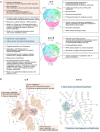Proteomic insights into survival strategies of Escherichia coli in perchlorate-rich Martian brines
- PMID: 40011700
- PMCID: PMC11865474
- DOI: 10.1038/s41598-025-91562-3
Proteomic insights into survival strategies of Escherichia coli in perchlorate-rich Martian brines
Abstract
Brines, potentially formed by the deliquescence and freezing point depression of highly hygroscopic salts, such as perchlorates (ClO4-), may allow for the spatial and temporal stability of liquid water on present-day Mars. It is therefore of great interest to explore the microbial habitability of Martian brines, for which our current understanding is, however, still limited. Putative microbes growing in the perchlorate-rich Martian regolith may be harmed due to the induction of various stressors including osmotic, chaotropic, and oxidative stress. We adapted the model organism Escherichia coli to increasing sodium perchlorate concentrations and used a proteomic approach to characterize the adaptive phenotype. Separately, the microbe was adapted to elevated concentrations of sodium chloride and glycerol, which enabled us to distinguish perchlorate-specific adaptation mechanisms from those in response to osmotic, ion and water activity stress. We found that the perchlorate-specific stress response focused on pathways alleviating damage to nucleic acids, presumably caused by increased chaotropic and/or oxidative stress. The significant enrichments that have been found include DNA repair, RNA methylation and de novo inosine monophosphate (IMP) biosynthesis. Our study provides insights into the adaptive mechanisms necessary for microorganisms to survive under perchlorate stress, with implications for understanding the habitability of Martian brines.
Keywords: Adaptation; Brines; Habitability; Mars; Perchlorate; Proteomics.
© 2025. The Author(s).
Conflict of interest statement
Declarations. Competing interests: The authors declare no competing interests.
Figures



Similar articles
-
Proteomic Insights into Psychrophile Growth in Perchlorate-Amended Subzero Conditions: Implications for Martian Life Detection.Astrobiology. 2025 Mar;25(3):177-188. doi: 10.1089/ast.2024.0065. Epub 2025 Feb 17. Astrobiology. 2025. PMID: 39960803
-
A New Record for Microbial Perchlorate Tolerance: Fungal Growth in NaClO4 Brines and its Implications for Putative Life on Mars.Life (Basel). 2020 Apr 28;10(5):53. doi: 10.3390/life10050053. Life (Basel). 2020. PMID: 32353964 Free PMC article.
-
Perchlorate-specific proteomic stress responses of Debaryomyces hansenii could enable microbial survival in Martian brines.Environ Microbiol. 2022 Nov;24(11):5051-5065. doi: 10.1111/1462-2920.16152. Epub 2022 Aug 10. Environ Microbiol. 2022. PMID: 35920032
-
Remarks on Life Feasibility on the Red Planet.Microorganisms. 2025 May 11;13(5):1105. doi: 10.3390/microorganisms13051105. Microorganisms. 2025. PMID: 40431277 Free PMC article. Review.
-
A Review of the "Black Beauty" Martian Regolith Breccia and Its Martian Habitability Record.Astrobiology. 2022 Jun;22(6):755-767. doi: 10.1089/ast.2021.0069. Epub 2022 Feb 25. Astrobiology. 2022. PMID: 35230137 Review.
Cited by
-
Survival strategies of Rhinocladiella similis in perchlorate-rich Mars like environments.NPJ Microgravity. 2025 May 22;11(1):18. doi: 10.1038/s41526-025-00475-y. NPJ Microgravity. 2025. PMID: 40399358 Free PMC article.
References
-
- Nazari-Sharabian, M., Aghababaei, M., Karakouzian, M. & Karami, M. Water on Mars—A literature review. Galaxies8, 40 (2020).
-
- Kass, D. M. & Yung, Y. L. Loss of atmosphere from Mars due to solar wind-induced sputtering. Science268, 697–699 (1995). - PubMed
-
- Haberle, R. M. et al. On the possibility of liquid water on present-day Mars. J. Geophys. Res. Planet106, 23317–23326 (2001).
-
- Piqueux, S. et al. Widespread shallow water ice on Mars at high latitudes and midlatitudes. Geophys. Res. Lett.46, 14290–14298 (2019).
-
- Titus, T. N., Kieffer, H. H. & Christensen, P. R. Exposed water ice discovered near the south pole of Mars. Science299, 1048–1051 (2003). - PubMed
MeSH terms
Substances
LinkOut - more resources
Full Text Sources
Molecular Biology Databases
Miscellaneous

